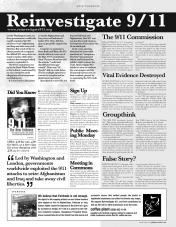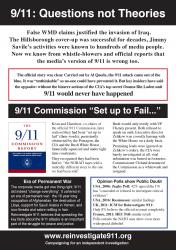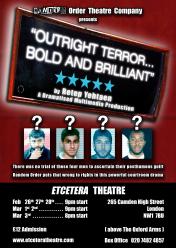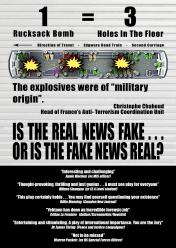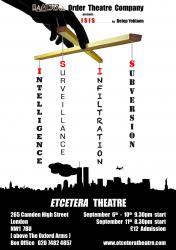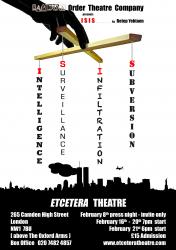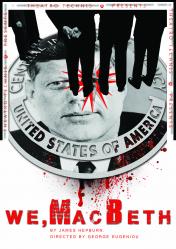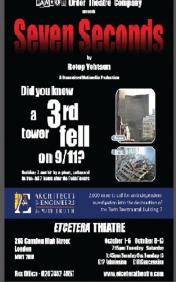FBI Whistleblowerr Ali Soufan On 9/11
Ex-FBI interrogator 'gagged' over 9/11
Night Sept 2011
"People in our government knew that they were here - we were not told” Ali Soufan
Ali Soufan Former FBI investigator
Former FBI agent Ali Soufan says he has not been allowed to tell the truth about 9/11 and events since
A former FBI agent who worked at the heart of America's battle against al-Qaeda has told the BBC he is being prevented from telling the truth as he challenges the back story of 9/11 and what has happened since.
Mr Soufan also argues against the effectiveness of interrogation techniques used by the CIA, such as water boarding.
Ali Soufan has not appeared on camera before, but he has now decided to speak out to counter what he sees as a misleading narrative about the last 10 years.
Mr Soufan has direct, first-hand experience of some of the most heated controversies of the past decade: whether 9/11 could have been prevented and whether tactics like the water boarding of al-Qaeda suspects were effective and justified.
Born in Lebanon, Mr Soufan came to America as a teenager and joined the FBI in the 1990s. As one of the only Arabic speakers he was assigned to early investigations on al-Qaeda.
'I threw up'
When the 9/11 attacks occurred, he was in Yemen investigating the bombing of the USS Cole.
The day after the attacks, he met a CIA officer at the US embassy in Yemen. The officer passed him an envelope.
Inside was a report detailing links between people Mr Soufan had been investigating for the warship bombing and two of the hijackers - who had been living in the US for months.
Mr Soufan says that written requests for this kind of information had been made three times before without any result.
"I think it was probably the worst feeling I have ever experienced in my life," he told BBC Newsnight in an interview.
"It was a combination of frustration, anger, sadness, betrayal. The only thing I recall is I left the office, went across the hall to the bathroom and I just threw up."
He believes the material would have made a difference.
"We were looking for them overseas. They were here. People in our government knew that they were here. We were not told," he says.
The CIA denies that it failed to share the intelligence.
"Any suggestion that the CIA purposely refused to share critical lead information on the 9/11 plots with FBI is baseless," a CIA spokesperson told the BBC in a statement.
Interrogator as God
The first senior figure linked to al-Qaeda to be arrested was Abu Zubaydah. He was taken to a secret CIA site. Mr Soufan was told to go out and interrogate him.
He still cannot disclose the site's location, but the BBC believes it to be Thailand. Zubaydah was still in pain from being shot during his capture.
Mr Soufan says he was able to extract valuable intelligence with traditional interrogation techniques. This included the first identification of Khalid Sheikh Mohammed as the mastermind behind the 9/11 attacks.
But some in Washington believed Abu Zubaydah knew more. They sent out a CIA contractor to test out his theories.
Zubaydah would become the guinea pig for what the CIA called "enhanced interrogation techniques".
"The idea was the detainee has to look at the interrogator as if he is his God. He is the one who determines if his life is going to be better or worse," Mr Soufan says of the CIA contractor's ideas.
Mr Soufan's objections to the techniques are primarily about their effectiveness.
"I'm not going to lose any sleep if a terrorist is nude," he says. "These things don't work.
"It's not going to work on a top-notch terrorist. My experience is you can catch way more flies with honey than vinegar."
Mr Soufan stood back as the CIA tested out its theories. He says it soon became clear that the techniques employed by the CIA contractor were not working.
The pressure was on to go further.
Mr Soufan became increasingly concerned - witnessing techniques he believed would be criminal in the US. He told the FBI he would arrest the contractor if he stayed.
The FBI told him to come home, and withdrew itself from the interrogation process. Zubaydah was then water boarded 83 times.
Former Vice-President Dick Cheney has argued these techniques were "legal, essential, justified, successful".
Mr Soufan challenges this view.
"Everything the proponents of enhanced interrogation techniques claim was obtained because of enhanced interrogation techniques and water boarding on Abu Zubaydah, we got when we were there on the ground before even enhanced interrogations existed," he says.
In response to his story, a US counter-terrorism official told the BBC that the CIA and FBI had different roles.
"Mr Soufan and his colleague were part of the initial questioning, when Abu Zubaydah was hospitalised, and Mr Soufan was trying to build a rapport," said the official.
"Later when Abu Zubaydah recovered, he stopped any pretence of co-operation.
"The CIA claim that after the FBI pulled its officers from the debriefings, and the decision was made to focus the debriefings on collection of intelligence and on pending attacks, he became very co-operative. "
Major redactions
Mr Soufan - who left the FBI in 2005 - believes that his attempts to challenge the narrative of 9/11 and what came afterwards is being deliberately blocked by the authorities.
His book, The Black Banners, is published in the US and UK on Monday.
The FBI did not object to the manuscript, but the CIA demanded major redactions.
In some cases, entire pages of the book have been redacted, including parts of Mr Soufan's testimony before the US Senate.
In certain passages, the words "I" and "me" have been redacted where Mr Soufan is relating his own eyewitness account of events.
"The suggestion that the Central Intelligence Agency has requested redactions on this publication because it doesn't like the content is ridiculous," a CIA spokesperson told the BBC.
"The CIA's pre-publication review process looks solely at the issue of whether information is classified... just because something is in the public domain doesn't mean it's been officially released or declassified."
Mr Soufan believes that the process has not been about what is or is not classified.
"People over there are redacting narrative; they are not redacting national security information," he told the BBC.
"They are trying to stop me and others from telling the world what really happened."
Reinvestigate911 says:
FBI Hero challenges official 9/11 Story While UK Opinion Poll Finds 80% Want Fair Reporting of 9/11 Doubters.
After shock 9/11 poll, FBI whistleblower adds to doubts:
Insider claims of a secret CIA decision in the runup to the 9/11 attacks have received support from key FBI agent at the time Ali Soufan, while an opinion poll released last week suggests sections of the public are not surprised by the new allegations.
Soufan's dramatic testimony adds to the storm triggered by the Richard Clarke, White House anti-terror co-ordinator when the 9/11 attacks took place. He has said the attacks could have been foiled but
“there was a high-level decision in the CIA ordering people not to share information". As the FBI was the designated lead counter-terrorism agency and the CIA was explicitly prohibited form operating in the US at the time, in the absence of secret orders from the Bush White House this failure to hand over information the FBI officers were expressly seeking may have been illegal.
Soufan was interviewed on the BBC's Newsnight on Tuesday by correspondent Gordon Corera. “People in our government knew that they (the 9/11 hijackers) were here - we were not told" He said that on receiving the CIA's dossier on September 12 "I think it was probably the worst feeling I have ever experienced in my life... It was a combination of frustration, anger, sadness, betrayal. The only thing I recall is I left the office, went across the hall to the bathroom and I just threw up." He recently told Der Spiegel "For me, this is something beyond incompetence".
Clarke has said the CIA's secret dossier on Al Qaeda was probably enough to foil the 9/11 attacks, a position that seems based on the clumsy paper trail the alleged hijackers were leaving across the US in the months up to 9/11.
In the weeks after 9/11 politicians in Washington and London were arguing for an invasion of Afghanistan and said the attacks were unthinkable, came out of the blue and could not have been prevented. Each of these assertions was quietly dropped in the 9/11 Commission report. Clarke first came to prominence when he told Washington's 911 Commission "your country failed you".
Last week Reinvestigate 911 released the first findings of an ICM poll, showing surprisingly high levels of doubt over the official 9/11 story. More people agree than disagree that it might turn out to be wrong in important respects. Only 8% strongly agree that they have been told the full story of the 9/11 attacks.
After excluding don't knows and those who neither agreed or disagreed, 37% of those who expressed an opinion agreed that rogue elements in the American intelligence services may have made a decision prior to 9/11 to allow a terrorist attack to take place. Up to now the official story was that the failures were the result of lost messages within the FBI, the lead counter terrorism agency, but that theory promoted by the CIA and repeated uncritically by friendly journalists has been exploded by the recent revelations. Many voters may not have been aware of the new claims when they answered the pollsters questions.
Following US-owned Liverpool football club's decision to investigate reserve striker Nathan Eccleston, 20, for twittering his theories, Reinvestigate 9/11 have released a further finding from the ICM poll commissioned last week. 59% of all respondents agree that broadcast regulator Ofcom should ensure fair reporting of 9/11 doubters compared to 6% who disagree.
Ian Henshall of Reinvestagate 911 says: "This poll makes it clear that a large number of people have doubts over the official 9/11 story and the vast majority want fair reporting of the issue. It is bad enough to slur 9/11 sceptics as conspiracy theorists, now there seems to be move to deny them free speech too."
Reinvestigate 911 points to the growing number of experts including members of the 911 Comission who say that there should be a new inquiry into what went wrong.
"We support the views expressed by John Le Carre on Radio 4 yesterday. We seek to retrieve the traditional rights that the anti-terrorism industry have snatched. We would add that this includes the right to know the whole story not the sanitised version produced by the 9/11 Commission. The response of the anti-terrorism industry to well-founded doubts over the official story seems to be to make angry assertions that all is well and elevate the official story into state promoted dogma. The attacks on a 20 year old footballer yesterday an example of sections of the media colluding in this. We suspect that the proposed education packs in schools will be one-sided, while people of all persuasions should be alarmed at calls for the government to infiltrate and disrupt websites where the official 9/11 story is disputed".
In London Southwark Council have voted for a controversial 9/11 memorial on Potters Field against the objections of both the park's management trust and the September 11 UK families support group.
(see note 1).
Notes
(1) Clarke's latest comments were reported in the tail end of the latest of the BBC's Conspiracy Files programmes and elicited a lame denial from ex-CIA analyst Phillip Mudd (sic), now working for the Obama White House. The Washington Post describes this issue as a "squabble". George Tenet's rebuttal calling the allegations baseless which they certainly are not. Presumably due to bad research most reports (if any) do not appear aware that Tenet's credibility was seriously undermined when was caught in multiple lies by the 9/11 Commission, denying that he had flown to meet George Bush in long secret meetings at Bush's ranch in the weeks before 9/11. He eventually said he had forgotten these meetings. The CIA's information concerned at least two hijackers and it is likely it would have aborted the attacks because the alleged Al Qaeda operatives were hopelessly incompetent, leaving a paper trail which connected all of them with each other.
(2) Soufan and Clarke are not the only witnesses. Coleen Rowley a senior lawyer in the FBI's Mineapolis office was made Time woman of the year after she went public to protest the behaviour of FBI HQ. In the famous Rowley Memo she described how she was blocked on spurious grounds from examining the laptop of 20th hijacker Zacharius Moussaoui who was under arrest for suspected intent to hijack and crash planes. At the time this failure was put down to mixed messages and overwork although her colleague Harry Samit later testified they were so angry that they sent over 60 memos to the obstinate officials at HQ who were blocking their investigation.
History Commons researcher Kevin Fenton has analysed a mass of evidence to confirm the assessment of Clarke and Soufan and identify the CIA-linked officials in the FBI who blocked Rowley and Samit. His book Disconnecting the Dots: How CIA and FBI officials helped to enable 9/11 and evaded government investigations is based on the extensive recently released official Inspector General reports from the Justice Department, the CIA and the Pentagon.
(3) The poll results are mirrored by polls in other countries. A HEC poll published last week in France found 58% with doubts compared to 31% percent who accept the official story. Half suspect that US authorities deliberately allowed the attacks to take place while a third suspect they were implicated in the execution of 9/11.
An EMID poll in Germany in December 2010 found that almost 90% of Germans are convinced that the US government has not told the whole story of the 9/11 attacks while in a 2008 poll WorldPublicOpinion.org found nearly 25% in Germany believed the US government carried out the attacks.
Levels of doubt in the UK poll were fairly even across social class and age, but higher in Scotland. High levels of don't know and neither agree or disagree indicate some respondents had not given the issue much thought. The figures show an even higher level of scepticism than the shock poll for the BBC released to coincide with the recent Conspiracy Files programme. Asked if they thought there was a wider conspiracy than Al Qaeda that included the American government, one in seven respondents and one in four young people said yes, with similar figures in a parallel poll the US.
Reinvestigate 911 is campaigning for a closer examination of unanswered questions they say remain on the table ten years later. They are holding a London conference on October 15 on what they call SCCADS, state and corporate crimes against democracy. Speakers will address issues from the David Kelly case to the rise to power of New Labour in the 1990s
Ian Henshall of Reinvestigate 9/11 says
"People remember the Iraq WMD fiasco which showed how wrong the official story can be, even on an important matter of war and peace".
"If Bush had properly investigated how the attacks came to happen instead of unleashing a bloodbath we would not be in the mess we are in now."
Senator Max Cleland resigned from the 911 Commission and denounced it as a whitewash and a national disgrace. John Farmer a senior Commission official later wrote that they had determined there was a decision to lie to them by the Pentagon and considered bringing criminal charges. The Commission's report made no mention of this nor the mysterious anti-hijack exercise running at the time of the attacks. It also left out any reference to the collapse of WTC 7 which was not hit by a plane and fell symmetrically at freefall speed into its own footprint.
Spiegel Online International
Ten Years After 9/11
11/09/2011
Former FBI agent Ali Soufan successfully interrogated captured Islamist terrorists after 9/11 without resorting to "enhanced' techniques. In a SPIEGEL interview, he revealed how he got jihadists to talk using tea and trucker magazines and explained how 9/11 could have been prevented.
SPIEGEL: How would you describe the state of the United States 10 years after 9/11, four months after the death of Bin Laden? Is this the beginning of the end of the story?
Soufan: It is the beginning of a new era. I think today, al-Qaida is definitely, significantly damaged. The al-Qaida that attacked us on 9/11 does not exist anymore. Its central command is very, very weak. In these 10 years, because of mistakes made, the United States' reputation was seriously damaged. But at the same time we have been working to reverse this damage: All secret jails have been closed. The enhanced interrogation techniques have been cancelled. Memos have been declassified, so we put it all out there and we said we face up to what we did. That's very rare in any country around the world.
SPIEGEL: You started investigating against Osama bin Laden and al-Qaida years before 9/11. Do you remember when you first heard bin Laden's name?
Soufan: The very first time I heard about him was in an Arabic magazine. They did an interview with him in Sudan and I was like: Who is this guy? Then I started reading about him in the papers and became a little bit concerned about the level of his rhetoric. And for a kid who grew up in Lebanon, I understood these kind of rhetorics. I kept following his statements until I joined the FBI in 1997. I mean it wasn't like: Oh my God, we have to pay attention to that guy. It didn't happen overnight. It was a process. But then, with bin Laden's fatwa in February 1998, a new level of interest started. Then I was 100 percent convinced that something was going to happen.
SPIEGEL: Your later boss at the FBI, John O' Neill -- who left the service to become head of security at the World Trade Center and who died in the 9/11 attacks -- was also aware of the potential danger of al-Qaida at a very early stage.
Soufan: John definitely understood the threat and I never met anyone who knows how to think about and work on a terrorism case in putting it together more than John. I learned a lot from him. I think he was phenomenal. And he saw the threat of bin Laden very early on, he continued fighting the fight. He saw what was coming up, with the East Africa embassy bombing, with the U.S.S. Cole. He fought the fight until the day he left and he knew that the big one was coming. Unfortunately nobody paid attention to it.
SPIEGEL: As you explain in your book, you are convinced that 9/11 might have been stopped if there had not been the so-called "Chinese wall" between the CIA and the FBI.
Soufan: We always worked together. We worked together during the East Africa embassy bombing. We had a great relationship. But suddenly that wall appeared due also to the misunderstanding of new guidelines organizing the relationship of intelligence and law enforcement. Unfortunately that directly contributed to the lack of knowledge about 9/11. We had actionable intelligence we transferred to the CIA but there was no follow-up.
SPIEGEL: What kind of information was that?
Soufan: We were investigating the Cole incident in Yemen. And we had a person who participated in blowing up the ship -- killing 17 sailors, injuring 39 -- tell us he delivered money to a main al-Qaida guy. So people who were involved in the Cole incident delivered money to two people who later flew a plane into the Pentagon. People in our government knew that these two people were in the United States, in San Diego. So, when you're doing an investigation and almost a year before you know about people moving and money and meetings, I think you have to understand that there are some limits to the wall. We had the lead, the CIA knew the identity of the two in San Diego but they did not put them on a no-fly list, they did not communicate their names to the State Department so that their visa would not be renewed.
SPIEGEL: Did they ever apologize for that?
Soufan: Yes, on Sept. 12, 2001, they told us: "Remember those two guys that delivered the money... Well they actually met two guys who we know and we didn't tell you that before. Sorry." Why didn't they check their computer screens before and say "Holy crap, look what's happening here." For me, this is something beyond incompetence.
SPIEGEL: In your book, you also criticize the fact that the US never really understood its enemy al-Qaida.
Soufan: I think we definitely underestimated the ideological motivations for these groups: what makes people blow themselves up, the religious signification of al-Qaida. It's not politics. The Chinese military strategist Sun Tzu said a long time ago: "If you know your enemy and know yourself, you will win a hundred times in a hundred battles." Unfortunately with the war on terror we forgot who we are, but also we didn't know our enemy. Look at al-Qaida. On the eve of 9/11, they had about 400 operatives. They led us into a war longer than World War I and World War II. Not because they are such smart people, but because we did not understand our enemy. Instead, we applied waterboarding and enhanced interrogation techniques. We did exactly what al-Qaida wanted us to do. When you do this, what are you proving to the guy? You're proving that everything he thinks about you is right. But if you come with a cup of tea, he doesn't know how to act.
SPIEGEL: That was your strategy as an interrogator, to come along with a cup of tea?
Soufan: Every interrogation is different. You have to get them out of their comfort zone. Even if conditions are harsh, it can still be a comfort zone. Because you behave like they expect the enemy to behave. You have to confuse them. I interrogated bin Laden's driver, Salim Hamdan, in Guantanamo. Another American before me had promised him that he could make a phone call to his wife. But he never could. When we came, he said to us: "All of you Americans, you are lying." And we found out that indeed they did not fulfill the promise they made. I said to him, "OK, we messed up. Sorry, I apologize." And I gave him the phone.
SPIEGEL: Did your method work?
Soufan: He couldn't believe it. But after he made the phone call and he heard his wife's voice, he kneeled and started crying and thanked God. We took him back, we gave him some water, tea. For about 20 minutes he didn't say a word. And then he started asking me about Yemen and then said: "OK, what do you want to know?"
SPIEGEL: At the time you were one of the few agents who could speak fluent Arabic and able to quote the Koran in interrogations.
Soufan: Sure, that helped. Many times I used to lay down on the ground next to to him, as if we were taking a nap, but we were talking. We brought fish sandwiches from McDonald's to Hamdan and US truck and car magazines from the local shop in Guantanamo. He read them all.
SPIEGEL: Truck magazines instead of waterboarding -- that was your recipe for success?
Soufan: You don't need to be tough. Why should you? Anyhow, he is in custody. He knows that you are the boss. You don't have to act like a boss.
SPIEGEL: Sounds nice, but what about the intelligence you gained from Hamdan?
Soufan: He might have been a key witness in upcoming trials. He knows everyone, being bin Laden's bodyguard, being bin Laden's driver, being the person who always was with bin Laden, the closest to bin Laden. He was driving the car when bin Laden and Ayman al-Zawahiri were talking with each other about the fourth plane. He was there when Khalid Sheikh Mohammed (ed's note: the planner of 9/11) briefed the leadership of al-Qaida about the 9/11 operation. He told us all that, he was willing to talk. It is another example of where I don't think we played it right.
SPIEGEL: You wanted him to be a key witness in the upcoming trials, even perhaps with a plea agreement?
Soufan: Yes, but then they suddenly declared him an "enemy combatant" without even coordinating with us. So when you declare him an enemy combatant, you give him a lawyer. So the person who's talking, you give him a lawyer so he can't talk anymore even if he was cooperating.
SPIEGEL: Who took that decision?
Soufan: The White House, based on Pentagon recommendations, being under a lot of pressure to prosecute people. So they said, let's declare them enemy combatants -- without thinking about the long-term effect of that. Hamdan was a historical witness, he could have been very useful for other cases and trials. Today, he is a free man, he had been sentenced to 5 years, time he already had spent in Guantanamo. He left quickly after the judgment. He is lost for us today.
SPIEGEL: You also interrogated another important key terrorist supporter, Abu Zubaydah. President Bush praised his capture in March 2002 in Pakistan as a great victory. The US government mistakenly considered him to be the number three in al-Qaida. Later he would be the first detainee to be subjected to waterboarding. What kind of condition was he in when you saw him for the first time?
Soufan: He was in a very bad health condition when we saw him after his capture. He was heavily injured because there had been a shooting, that was a very big concern for us. But one of the things that happened is immediately upon his capture he was cooperating with us and because of his cooperation and because he was giving us some actionable intelligence, Washington said: Death is not an option. So we needed to do everything possible to keep him alive because he had a lot of good information.
SPIEGEL: So you were treating his wounds and establishing a real relation with him?
Soufan: Yes, and when his condition became really critical so that we got a call that he would die and that we should hurry up with our questions, we took him to a hospital where he underwent surgery. In the hospital, we continued the interrogations. During that time he told us about the last time he spoke with bin Laden, the people who were there, and what he wanted to do in this operation. And he gave us a location. I said: "So, who's in charge of that operation?" He said so and so from bin Laden's gang. And we knew so and so. We had his picture, it was on the 22 "most wanted" terrorists poster.
SPIEGEL: So, once again your method was successful?
Soufan: In fact, by accident it was. I said to my partner: "Give me the photo of that guy." And he loaded it out of the poster of the 22 most wanted on his Palm Pilot, as we had no FBI photobook with us. We both had the same guy in our mind. Then he gave his Palm to me, you know these old ones, with the small screen. We hit the wrong photo without realising. So, I gave the Palm to Zubaydah asking him if this was the guy we were talking about. And he said: "No." And I really got pissed off, because we had cleaned the guy, we kept him alive, we thought we had something and now he was lying to us. And I said: "Oh yeah, and who is this?" And he looked at me and said: "Don't play games with me, brother. This is Mukhtar. This is the guy who did 9/11." I'd been hearing about this guy Mukhtar, I knew he was important, so I looked at it and it was Khalid Sheikh Mohammed. At that time we did not know that KSM, as we called him, was a member of Al-Qaida. So Zubaydah gave us the details of what happened on 9/11. It wasn't waterboarding. It wasn't torture. It was an accident and a lot of luck and a certain kind of relation we had with him.
SPIEGEL: President Bush confirmed that the important revelation that KSM had been the chief planner of 9/11 came from Zubaydah but said it was one of the results of the "enhanced interrogation techniques."
Soufan: I know that version. Bush presented it as the success of the EITs. It was not. The CIA contractors who later used enhanced interrogation techniques on Zubaydah in a blacksite prison, at a location I cannot reveal to you, were not even on the ground at that time. It was Zubaydah in his hospital bed who told us how Khalid Sheikh Mohammed came up with this idea to him. KSM was trying to find a sponsor for the operation and Zubaydah said to him: "Go talk to Bin Laden. He will sponsor you." He told it to us, not to the CIA.
SPIEGEL: Do you know of any really decisive intelligence that was obtained under torture or under the special interrogation techniques?
Soufan: Nothing I can think of. If you tell me that we saved lives because of that, maybe I'll shut my mouth. But most of the people who went to Iraq to fight against us in Iraq, their motivation were the pictures of Abu Ghraib. So, basically, it cost lives. And I just do not believe in these methods. After 183 sessions of waterboarding, 9/11 planner Khalid Sheikh Mohammed still lied about the so-called Kuwaiti, Abu Ahmed al-Kuwaiti, the courier who finally led us to bin Laden this May. KSM claimed that he was a low-level guy and not important. We now know this was not true.
SPIEGEL: The CIA heavily redacted your new book "The Black Banners" and blacked out numerous parts, especially those about the enhanced interrogation techniques. Did you expect this kind of reaction?
Soufan: As a former FBI agent I had to submit the book to my former agency, which I left in 2006 because I could no longer continue there. I wanted to start something new. I was very surprised by the CIA's reaction. They even blackened it when I said "I" or "me" or "our." They blackened things I said in a public Senate hearing. I mean, it is all public. They redacted things that were already in the public domain. This is absurd, completely absurd. I plan to compel disclosure of the redacted information through legal means now.
SPIEGEL: Mr. Soufan, thank you very much for this interview.
Interview conducted by Britta Sandberg.





